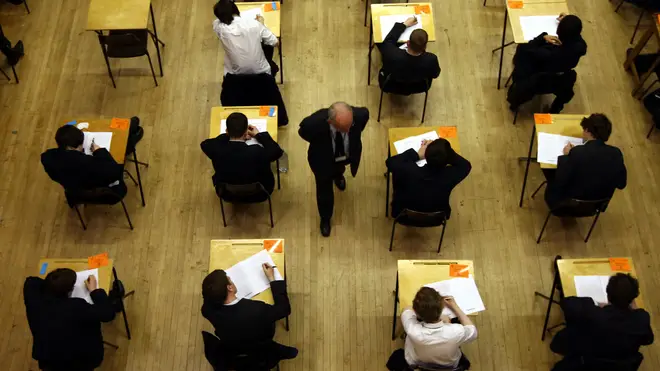
Henry Riley 7pm - 10pm
11 August 2020, 22:46

A-level students in England will be able to use mock exam grades to get into university, the Education Secretary is set to announce.
Results in mock tests - which were held before schools were forced to close amid the Covid-19 crisis - will carry the same weight as the calculated results to be awarded this month, the Government will say.
GCSE students will also be able to use mock marks to progress to college courses and employment in the shake-up.
The move comes after unions called on the UK Government to follow Scotland's lead in scrapping moderated grades after the downgrading of more than 124,000 results was reversed.
In a U-turn announced on Tuesday, Scotland's Education Secretary John Swinney revealed that downgraded results would revert to the grades estimated by pupils' teachers.
It comes after this year's summer exams were cancelled amid Covid-19. Teachers were told to submit the grades they thought each student would have received if they had sat the papers.

Scotland's Education secretary John Swinney announces exam results will be upgraded
Exam boards have moderated these grades to ensure this year's results - for students in England, Northern Ireland and Wales - are not significantly higher than previous years.
But now Education Secretary Gavin Williamson is due to tell students in England awaiting their A-level results this week that they can keep their grades in mock exams if they are higher than the calculated grade.
Students will still be able to sit exams in the autumn if they are unhappy with the grades they secured in mock exams, or if they are dissatisfied with results awarded by exam boards on Thursday.
All three grades will hold the same value with universities, colleges and employers, the Department for Education (DfE) is expected to say.
Mr Williamson is also due to announce an additional £30 million in funding to help schools and colleges carry out the autumn exam series for students wishing to sit GCSE and A-level exams.
But the appeals process - where individual students in England are dependent on schools and colleges to appeal against results on their behalf - is expected to remain the same.

Ex-chief examiner suggests coronavirus exams strategy
Mr Williamson said: "Every young person waiting for their results wants to know they have been treated fairly.
"By ensuring students have the safety net of their mock results, as well as the chance of sitting autumn exams, we are creating a triple lock process to ensure they can have the confidence to take the next step forward in work or education."
Evidence will need to be presented to satisfy the exam board that the mock exam was genuine.
The announcement comes as Labour warned that Boris Johnson risked "robbing a generation of young people of their future" unless unfairness in the exams system was addressed.
Concerns were raised by Labour that A-level and GCSE results could be downgraded for thousands of pupils in England because of the replacement grading system introduced.
Labour leader Sir Keir Starmer said: "The SNP have been forced into a humiliating U-turn after a shambolic few days.
Listen & subscribe: Global Player | Apple Podcasts | Google Podcasts | Spotify
"With 24 hours before results are released, I would urge the Prime Minister to change course, or he risks robbing a generation of their future."
Geoff Barton, General Secretary of the Association of School and College Leaders, accused the Government of a "panicked and chaotic response".
He said: "The idea of introducing at the eleventh hour a system in which mock exam results trump calculated grades beggars belief.
“The government doesn't appear to understand how mock exams work. They aren't a set of exams which all conform to the same standards.
“The clue is in the name 'mock'. And some students will not have taken them by the time that schools were closed in March.
“So, this immediately creates the potential for massive inconsistency.
"Schools and colleges have spent months diligently following detailed guidance to produce centre-assessed grades only to find they might as well not have bothered.
“There is certainly concern about the standardisation process applied by the exam boards, but there are also good reasons for having this system in place because it ensures that this year's grades are roughly in line with those of previous years, and this is important in terms of fairness to students over time."